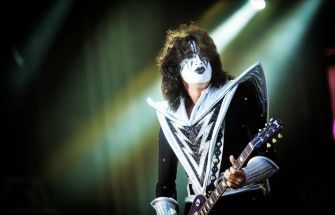Ace Frehley, the guitarist whose distinctive style and “Spaceman” persona helped define Kiss’s rise from New York clubs to global stages, died Friday in Morristown, New Jersey. He was 74. His representative, Lori Lousararian, said his death followed a recent fall at his home.
Frehley’s family said in a statement that he died surrounded by loved ones. “We cherish all of his finest memories, his laughter, and celebrate his strengths and kindness that he bestowed upon others,” they wrote. “The magnitude of his passing is beyond comprehension.”
Born Paul Daniel Frehley in the Bronx, he grew up balancing interests in sports and music before deciding his hands were “too important” to risk on the football field. A self-taught guitarist influenced by the Who and Cream, Frehley spent years in local bands before responding to a Village Voice ad seeking a “lead guitarist with flash and ability.”
He arrived at the audition wearing mismatched shoes, prompting laughter from Gene Simmons, Paul Stanley, and Peter Criss, until he started playing. His improvised solo on “Deuce” earned him a spot in the nascent group. The band, which soon became Kiss, would adopt heavy makeup, leather costumes, and a high-volume theatrical approach that defined 1970s arena rock.
By 1975, with the release of Alive!, Kiss had transformed from a cult act into a national phenomenon. Frehley’s lead guitar work became central to the band’s sound on songs like “Cold Gin,” “Shock Me,” and “Parasite.” Known for his unassuming demeanor offstage and confident stage presence, he was often considered the most relatable member of the group.
In 1978, each member of Kiss released a solo album. Frehley’s self-titled record outsold the others and produced the hit “New York Groove,” which became his signature song. But as Kiss’s popularity expanded into merchandising and younger audiences, Frehley grew uneasy with the shift from raw rock toward spectacle. “We were this heavy rock group,” he said years later. “Then suddenly there were lunch boxes and dolls in the front row. It became a circus.”
Behind the scenes, Frehley battled addiction and creative frustration. He spoke openly about the band’s excesses, recalling sessions where “there was so much cocaine in the studio, it was insane.” By 1982, he left Kiss, saying he feared staying would destroy him. “I walked out on a $15 million contract,” he later said. “Everyone thought I was crazy.”
Frehley spent much of the next decade with his project Frehley’s Comet, releasing two albums and touring modestly. Though he never regained Kiss’s level of fame, his influence endured among guitarists who admired his tone and phrasing.
In 1996, Frehley reunited with Simmons, Stanley, and Criss for a massive world tour following their MTV Unplugged appearance. The tour’s success reaffirmed the band’s status as a cultural fixture, but tension resurfaced during the recording of 1998’s Psycho Circus, where Frehley claimed he was invited to play on only one song. He left the band again in 2002, replaced by Tommy Thayer, who continued performing in Frehley’s Spaceman makeup. “He played the right notes,” Frehley once said of Thayer, “but he didn’t have my swagger.”
Frehley continued to tour as a solo artist, performing Kiss classics alongside his own material. His final performance took place last month in Providence, Rhode Island, closing, as always, with “Rock and Roll All Nite.”
Frehley and the original Kiss lineup were inducted into the Rock & Roll Hall of Fame in 2014. In a joint statement following his death, Simmons and Stanley called him “an irreplaceable part of the band’s most formative years” and said his memory would remain “forever linked to Kiss’s legacy.”
Reflecting on his career in a 2013 Rolling Stone interview, Frehley summed up his resilience with characteristic understatement: “My life’s been a roller coaster, but somehow I’ve always been able to land on my feet and still play the guitar.”






